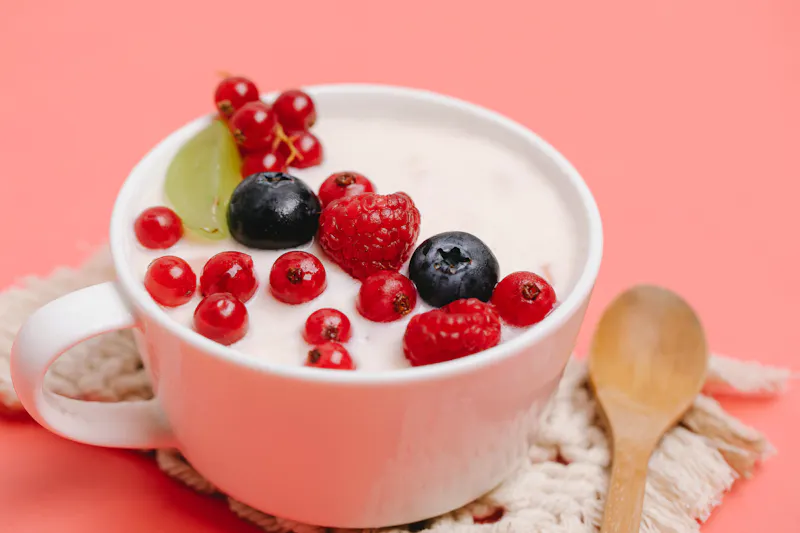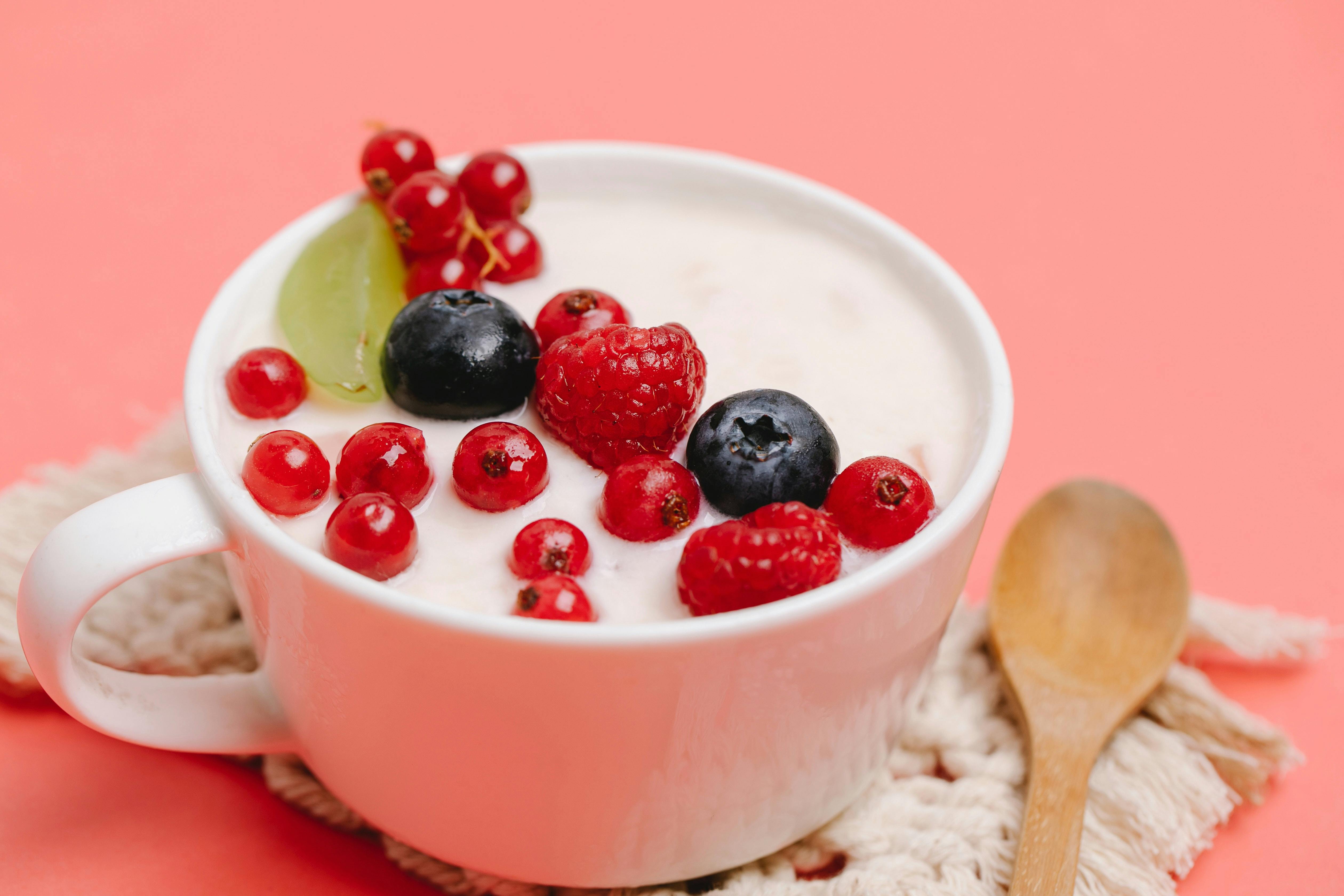What are probiotics?
What's covered?



Probiotics are types of live bacteria and yeast (similar to the ones already living in your gut) that you can digest. They’re found in certain foods like some yoghurts and other fermented foods like kimchi, kombucha, sauerkraut, and kefir. You can also get probiotic supplements — although it’s not clear yet which microbes and doses are the most helpful.
What are probiotics?
Probiotics are a type of bacteria that are thought to have a wide range of health benefits. They're found in certain types of food and, when digested, help restore balance in your gut microbiome.
There are dozens of different groups of probiotics, and very little is known about them. The most popular groups are Lactobacillus and Bifidobacterium — which are commonly advertised on yoghurt. Yet each group is made up of numerous species and each species is made up of even more strains. What’s more, each species within a group can have different effects on your body.

What are prebiotics?
Prebiotics aren't the same as probiotics. They're a type of fibre found in food. Although you can’t digest prebiotics, they’re eaten by the healthy microbes in your gut, allowing them to grow.
What are the health benefits of probiotics?
Although research is still at an early stage, and there is not much evidence to support many of the claims made around probiotics, many experts agree that they are beneficial to your health.
However, there is now more and more solid evidence showing that probiotics do have a positive impact on two issues: Irritable bowel syndrome (IBS) and diarrhoea caused by antibiotics.
How probiotics help with IBS
Research has shown that there's a strong link between an upset microbiome and IBS. Taking certain probiotics helps restore balance in your gut, reducing certain symptoms of IBS, including bloating and constipation.
How probiotics help with diarrhoea caused by antibiotics
A side effect of taking antibiotics is that they can kill off some of the ‘good’ bacteria in your gut, as well as the harmful types. This can lead to diarrhoea. Probiotics help restore balance in your microbiome, reducing diarrhoea.
Other potential benefits of probiotics
Several studies are being carried out to get a deeper understanding of the potential benefits of probiotics. Although areas that are being explored include skin, inflammation, blood pressure, and cholesterol, two of the most popular topics are mental health and weight loss.
Probiotics and mental health
Your gut-brain connection means your brain and gut can communicate directly with each other. And there’s some interesting research showing a link between lower levels of “good” bacteria in your gut and depression. So it makes sense that replenishing your gut with more “good bacteria” might help improve your mental health.
Specific strains of probiotics have been shown to help reduce the symptoms of anxiety and depression in people with clinical depression. Probiotics being used to improve mental health even have their own name — psychobiotics. As mentioned, it’s still early days in this area of research but it’s promising.
Probiotics and weight
There has been a lot of speculation about the link between your gut and weight. It’s been noted that people who are obese have different gut bacteria to people of normal weight. And some research has shown that specific probiotic strains can help people lose weight. But the evidence is mixed, with some animal studies showing weight gain from probiotics, not a loss.
To sum it up, it’s very early days for this area of research and you shouldn’t consider probiotics as a way to lose weight.
What foods are high in probiotics?
Probiotics have been a part of a healthy diet for hundreds of years, and are found in a variety of food including:
- yoghurts — The best-known food to contain probiotics. But, not all yoghurts have probiotics, always check the label to ensure they weren’t killed off during production.
- kombucha — a fermented tea drink. Live bacteria and yeasts are added to a tea base. They are then left to ferment and create Kombucha. Because of this, Kombucha is filled with prebiotics. However, many of the health claims made about the drink are not yet confirmed by science.
- gherkins — Leaving cucumbers in a salt-water solution turns them into pickles (or gherkins), which are high in probiotics.
- kimchi — a Korean dish, made from fermented vegetables. It’s mostly fermented cabbage with added spices like ginger, garlic and chilli peppers.
- sauerkraut — another type of fermented cabbage. In sauerkraut, the cabbage is fermented with lactic acid bacteria.
Issues with probiotics to be aware of
Because probiotics are classed as food, they're not as strictly regulated like medicines. This means that you should always double-check that:
- the product you’re buying actually has the bacteria stated on the food label
- there are enough bacteria in the product to have an effect
- the bacteria can live long enough in your gut for them to have an effect
National Center for Complementary and Integrative Health (NCCIH) 2019. Probiotics: What You Need To Know. Retrieved October 2019. https://nccih.nih.gov/health/probiotics/introduction.htm
Gibson, G. R., & Roberfroid, M. B. (1995). Dietary modulation of the human colonic microbiota: introducing the concept of prebiotics. The Journal of nutrition, 125(6), 1401-1412.
Fuller, R. (Ed.). (2012). Probiotics: the scientific basis. Springer Science & Business Media.
Hill, C., Guarner, F., Reid, G., Gibson, G. R., Merenstein, D. J., Pot, B., ... & Calder, P. C. (2014). Expert consensus document: The International Scientific Association for Probiotics and Prebiotics consensus statement on the scope and appropriate use of the term probiotic. Nature reviews Gastroenterology & hepatology, 11(8), 506.
A. Parnell, J., & A. Reimer, R. (2012). Prebiotic fiber modulation of the gut microbiota improves risk factors for obesity and the metabolic syndrome. Gut microbes, 3(1), 29-34.
EFSA Panel on Dietetic Products, Nutrition and Allergies (NDA). (2014). Scientific Opinion on the substantiation of a health claim related to a combination of Bifidobacterium longum LA 101, Lactobacillus helveticus LA 102, Lactococcus lactis LA 103 and Streptococcus thermophilus LA 104 and reducing intestinal discomfort pursuant to Article 13 (5) of Regulation (EC) No 1924/2006. EFSA Journal, 12(5), 3658.
Kappelman, M. D., Moore, K. R., Allen, J. K., & Cook, S. F. (2013). Recent trends in the prevalence of Crohn’s disease and ulcerative colitis in a commercially insured US population. Digestive diseases and sciences, 58(2), 519-525.
Saez-Lara, M. J., Gomez-Llorente, C., Plaza-Diaz, J., & Gil, A. (2015). The role of probiotic lactic acid bacteria and bifidobacteria in the prevention and treatment of inflammatory bowel disease and other related diseases: a systematic review of randomized human clinical trials. BioMed research international, 2015.
Wang, H., Lee, I. S., Braun, C., & Enck, P. (2016). Effect of probiotics on central nervous system functions in animals and humans: a systematic review. Journal of neurogastroenterology and motility, 22(4), 589.
Hempel, S., Newberry, S. J., Maher, A. R., Wang, Z., Miles, J. N., Shanman, R., ... & Shekelle, P. G. (2012). Probiotics for the prevention and treatment of antibiotic-associated diarrhea: a systematic review and meta-analysis. Jama, 307(18), 1959-1969.
Hill, C., Guarner, F., Reid, G., Gibson, G. R., Merenstein, D. J., Pot, B., ... & Calder, P. C. (2014). Expert consensus document: The International Scientific Association for Probiotics and Prebiotics consensus statement on the scope and appropriate use of the term probiotic. Nature reviews Gastroenterology & hepatology, 11(8), 506.
National Health Service (2019). Probiotics. Retrieved October 2019. https://www.nhs.uk/conditions/probiotics/